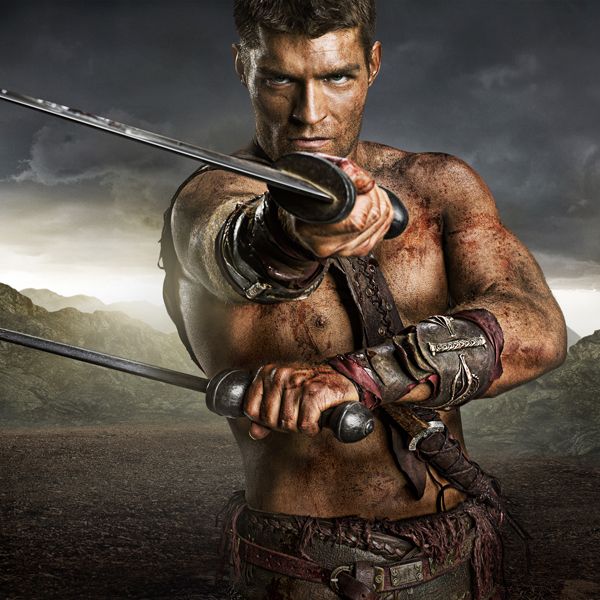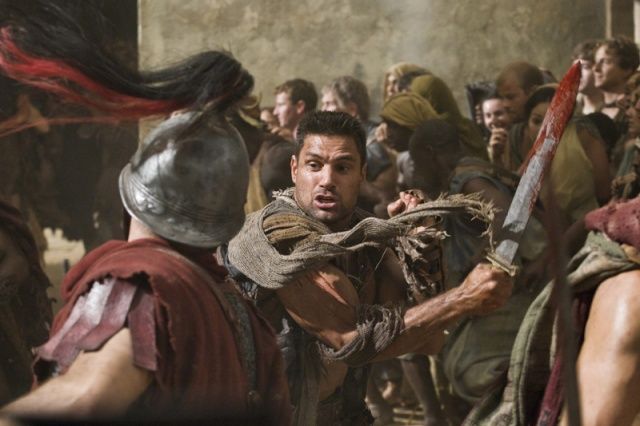Ahead of the Friday premiere of Starz's Spartacus: Vengeance, creator and co-executive producer Steven S. DeKnight took time out from writing Season 3 to talk with journalists about the new season, but jokingly warned, “You will get no spoilers from me!”
The death of star Andy Whitfield hangs over the season, and DeKnight acknowledged that one of the challenges was finding someone who wouldn’t attempt to duplicate the actor. “He was such a singular amazing talent,” he said. “We wanted to find somebody that had the same base qualities of compassion. I told all the actors during auditions that even though Spartacus may fly into a rage now and again, it’s never from a place of anger. It’s always from a wounded heart. We really felt like Liam [McIntyre] captured that essence.”
“We had a discussion before we started writing this season of should we tailor this show for Liam,” DeKnight said. “My feeling, and Rob [Tapert] and Starz agreed, was no. What we should do is write Spartacus as Spartacus. Liam will bring what he brings to it and it will be a different take but what Spartacus says and what he does will still be consistent with the Spartacus that we know.”
One aspect of the show that kept coming up was how no character is safe. “On this show characters literally get the ax,” DeKnight joked. “It always comes from the story: How is the story best served by a character’s death? I don’t ever want somebody to just die."
While he doesn’t regret killing anyone off, DeKnight admitted that losing John Hannah was hard: “He had to go, but that was a painful one.” Part of that reason was because Hannah’s character Batiatus was the one that DeKnight most related to, with his “ranting, profanity-filled monologues” reflecting the producer's own inner monologue.
The new season is very different for many reasons, first and foremost because of the changes the lead character goes through.
“This was always planned to be the season where [Spartacus] goes from a man searching for his personal redemption for the death of his wife and his feelings of responsibility for that and transitioning him into a true leader," DeKnight said. "It’s a very, very bumpy ride for him to go from someone that we see in Season 1, where he’s a good man but he is much more concerned about himself and his wife; everybody else is secondary. This is where he starts to move into more caring about the group and putting their needs above his own eventually.”
That doesn’t mean it’s an easy ride, which is an aspect of the show DeKnight enjoys. “Our band of heroes are not Robin Hood and His Merry Men," he said. "They have a lot of problems internally, which is very historical since they kept breaking apart and different groups would split away from Spartacus.”
When asked about criticism, DeKnight joked that the drama welcomes it, and that Starz has been very supportive. One steady complaint he's received, but dismisses, regards the gay content. “As far as I’m concerned, it’s barely in there to start with," he said. "It was part and parcel of that world, and it’s part and parcel of our world now, so I just ignore that. If people want to stop watching the show because two guys kiss, I shrug my shoulders.”
As far as plotting the show each season and beyond, DeKnight said history has always been his guidepost. However, he made clear that concern for historical detail doesn't trump entertainment. The show’s consultants, Aaron Irvin and Jeffrey Stevens, are involved throughout the scripting process, and contribute copious notes to the production team.
DeKnight, who described his attitude toward history as "respectful," admitted the subject isn't his strong suit. “The only thing I knew about Roman history was Stanley Kubrick’s Spartacus,” he joked. “I had a lot of reading and catching up to do when I signed on.”
Following the historical record, the character of Glaber (played by Craig Parker) returns and take on a much bigger role this season. “He is the big bad of our season,” DeKnight said. “Historically he is the next guy that was sent after Spartacus, and we follow that history here. He’s going to be Spartacus’ arch-nemesis, nipping at his heels for the entire season.”
“In reference to how Spartacus dies, most people think he was nailed to the cross like you see in Stanley Kubrick’s movie, but that’s not actually what happened,” DeKnight said. “One of the great things about the story of Spartacus is that there’s only fragments left in history and most of those are who won this battle, who won that battle. There’s no emotional detail in it. We are going to basically follow history but the audience, I think, will still be surprised at how we wrap up this story.”
When asked about the language on the show and whether it takes any cues from Latin, DeKnight admitted he made it all up. “In Latin they do use articles. I tend to drop out ‘and’s’ and ‘the’s’ when they speak. It’s to give a flavor of antiquity to the language," he said. "For me, I studied as a playwright, so I was deeply steeped in Shakespeare, which is my main influence in the dialogue.”
“I would say the language is a cross between Shakespeare and Robert E. Howard who wrote all the Conan stories,” DeKnight said, emphasizing that it’s not historically accurate. “When people bring that up to me that people didn’t speak this way in Latin, well, in Shakespearean times they didn’t speak in iambic pentameter. That’s an affectation to give it a style, which is exactly what we want to do on this show. About five scripts in I realized, 'Oh, shit, I have to keep writing this way for the rest of the series.'”
The dialogue means it takes longer than usual to write a script, but that’s not the only difference between writing a show for Starz and working on one for a broadcast network. “I didn’t have to water things down,” DeKnight said. It wasn’t about sex and violence so much as it was the ability to write more complex characters. “Good characters could do bad things, which is often very difficult to get the network to sign off on. And bad characters could do good things. I get to work in a very gray world, which is where the most interesting drama is.”
While many viewers and critics may focus on the show's sex and violence, DeKnight said every sex scene or fight scene has an emotional component driving it. The challenge for the writers is finding the balance between pulpy entertainment and true human emotion. “When Spartacus and Crixus fight Theokales in the arena in the middle of the [first] season, it couldn’t just be about the fight," he said. "t was really about these two men trying to find a common ground and come together.”
Spartacus: Vengeance premieres Friday at 10 p.m. ET/PT on Starz.
Related: Katrina Law Talks Testosterone, Stamina and Spartacus: Vengeance



